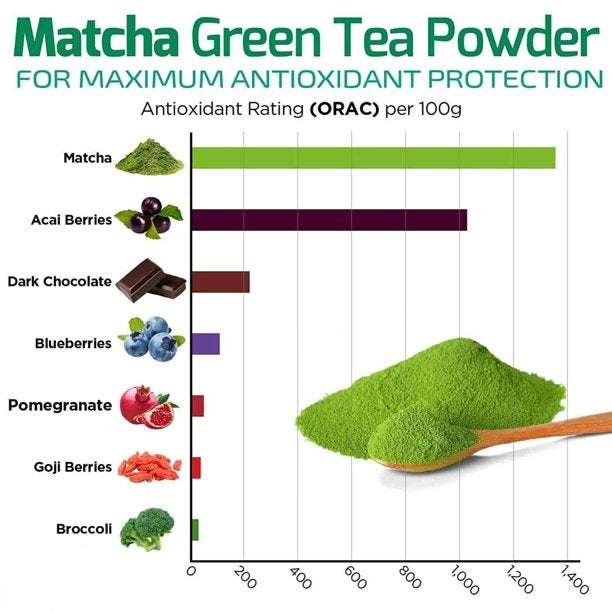Matcha has recently gained popularity, with matcha-driven lattes and teas available in health food stores as well as coffee shops. Tea is made from the leaves of the camellia sinensis plant. However, it's grown differently and has a different nutrient profile than green or black tea.
To make high-quality matcha, tea growers cover their plants for about 20 to 30 days before harvest. This causes the plant's amino acid content and chlorophyll levels to rise and therefore its vivid green color—to increase.
After the tea leaves have been picked, the stems and veins are removed. The remaining green leaf is ground into a fine powder called matcha. As matcha is made from the entire tea leaf, it contains more caffeine and antioxidants than other forms of green tea.
The leaves of the Camellia sinensis plant, when ground down into a powder and brewed as tea, have been shown to provide a variety of health. organic matcha green tea is a choice for many health-conscious people. It's not just because it tastes delicious but because it contains many health-promoting nutrients.
7 Incredible Health Benefits Of Matcha Tea That You Want To Incorporate Into Your Daily Diet
#1. Antioxidant Champion
Antioxidants are natural substances that protect against cell damage caused by free radicals. Matcha tea is high in antioxidants and may help to reduce the risk of cancer, cardiovascular disease, and neurological disorders. It contains about six times more antioxidants than regular green tea, according to a study published in the "Journal of Agricultural and Food Chemistry."
It also contains an amino acid called L-theanine, which helps relax the body and mind while increasing alertness and focus. This property makes matcha ideal for meditation or yoga practice.
#2. Protects Your Liver From Damage
The liver is responsible for processing toxins from the body, so if it's not functioning properly, you may experience symptoms like fatigue, weakness, or poor digestion.
Matcha is a great way to protect your liver. The caffeine and other nutrients in matcha help protect the liver from damage caused by free radicals. The antioxidants found in matcha can also help stabilize cell membranes and keep them flexible, preventing the formation of harmful molecules that can damage the liver.
#3. Boosts Brain Function
The main ingredient in matcha tea is l-theanine, which is an amino acid found in green tea leaves. Theanine is found in higher concentrations in matcha than in other types of tea, and it’s thought to be responsible for the positive effects on mental clarity and concentration.
This amino acid is proven to improve memory function by boosting blood flow to the brain, alleviating anxiety, and improving attention span. Hence, matcha tea is a great way to boost your brain function. It contains catechins, which are antioxidants that help keep your brain healthy.
#4. Reduces Stress
Matcha contains high amounts of L-theanine, which can help reduce anxiety by inhibiting the release of stress hormones like cortisol and adrenaline. This leads to better sleep quality and reduced levels of inflammation in the body, which may also help relieve stress symptoms such as fatigue, headaches, or joint pain.
Some studies have observed that Matcha reduces mental fatigue and improves concentration. The antioxidants present in Matcha can reduce the production of free radicals and protect the body against oxidative stress.
#5. Prevents Cancer
Matcha tea has been proven to have a protective effect against cancer because it contains high amounts of catechins, a group of chemicals that can protect cells from damage and inflammation. Catechins are found in many foods and beverages, including coffee, green tea, berries, and red wine.
#6. Promote Heart Health
Japanese matcha green tea powder has been proven to improve blood circulation and the flow of blood through the body, which can be helpful for people with coronary artery disease or congestive heart failure. Drinking one cup of matcha per day lowered cholesterol levels and improved endothelial function in patients with metabolic syndrome. It may help prevent high blood pressure and stroke.
Researchers have found that matcha tea significantly reduced blood vessel stiffness and improved endothelial function in subjects with hypertension, which is a major risk factor for stroke, compared to those who drank only water or other beverages.
#7. Helps You Lose Weight
The key ingredient in matcha tea is called EGCG, which stands for epigallocatechin gallate. This compound has been shown to increase your body's production of nitric oxide, a natural hormone that helps you burn fat more efficiently. Also, it binds fat cells and stops them from entering our bodies. So when you eat something, the fat simply runs through your intestinal tract.
Organic Matcha Green Tea Powder And Ceremonial Grade Matcha: Which is Better?
Organic Japanese matcha is a highly concentrated form of matcha. It's made with finely milled green tea leaves that have been steamed, bruised, and ground into a powder. As a result, you get super-premium, high-potency matcha that is packed with antioxidants and amino acids to help boost your metabolism and fight fatigue.
Matcha ceremonial grade, on the other hand, is a more expensive form designed specifically for use in ceremonies and special events. It's made from the best leaves and has been hand-processed for longer than regular matcha. It contains more antioxidants, vitamins, and minerals than regular grade.
The Bottom Line
To sum up, Matcha tea is the perfect beginner's tea for health enthusiasts or those who want to make a lifestyle change. The health benefits of this magical tea are endless. You can easily incorporate it into your diet to add some flavor to your day!

